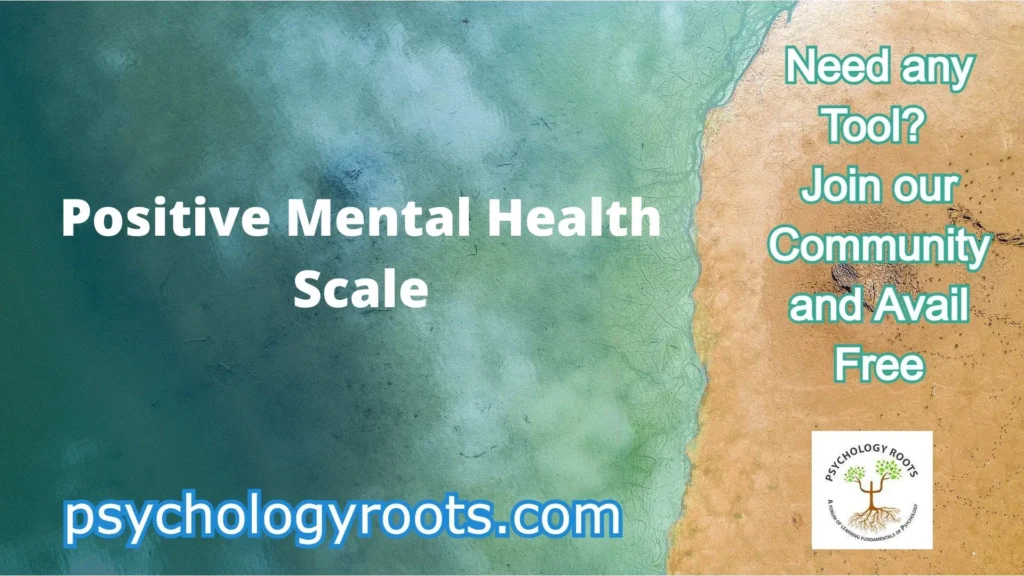Table of Contents
Positive Mental Health Scale
Here in this post, we are sharing the “Positive Mental Health Scale”. You can read psychometric and Author information. We have thousands of Scales and questionnaires in our collection (See Scales and Questionnaires). You can demand us any scale and questionnaires related to psychology through our community, and we will provide you with a short time. Keep visiting Psychology Roots.
About Positive Mental Health Scale
Scale Name
Positive Mental Health Scale
Author Details
Justina Lukat, Jürgen Margraf, Rainer Lutz, William M. van der Veld & Eni S. Becker
Translation Availability
he scale is available in 12 languages.
- ARABIAN VERSION
- CHINESE VERSION
- ENGLISH VERSION
- FRENCH VERSION
- GERMAN VERSION
- ITALIAN VERSION
- LITHUANIAN VERSION
- POLISH VERSION
- SERBIAN VERSION
- SPANISH VERSION
- SWEDISH VERSION
- RUSSIAN VERSION
Urdu Translation
Not Sure

Background/Description
The PMH-scale was originally developed by Lutz et al. (1992a, unpublished manuscript) in order to provide a brief, unidimensional and person-centred instrument to assess positive mental health. In the present series of studies the PMH-scale was confirmed to be a unidimensional self-report instrument with high internal consistency, good retest-reliability, scalar invariance across samples and over time, good convergent and discriminant validity as well as sensitivity to therapeutic change in a series samples from very different backgrounds.
The unidimensional structure of the PMH-scale suggests that it indeed measures a single concept. The equivalence tests indicate that the PMH-scale can be validly used to compare PMH-scale scores over groups and across time. The good test-retest reliability for the retest samples and the moderate correlation between the first and second measure for the psychosomatic patient group and Dresden sample suggests that the PMH-scale is both: stable over time and sensitive to change. With only nine items, the PMH-scale is brief and easy to interpret.
The Positive Mental Health Scale (PMH-Scale) is a self-report tool designed to measure positive mental health, focusing on psychological well-being rather than pathology. Developed to assess subjective well-being, the scale includes factors such as emotional, psychological, and social health. It emphasizes a holistic view of mental health, aligning with modern perspectives that mental health is more than the absence of mental disorders.
The PMH-Scale consists of 9 items, using a Likert scale format, and provides a concise yet comprehensive assessment. It has been validated across various populations, demonstrating robust psychometric properties. This tool is widely used in both research and clinical settings to evaluate interventions aimed at promoting positive mental health.
Administration
- Obtain a copy of the Positive Mental Health Scale (PMH-Scale) from academic sources.
- Explain the purpose: To assess an individual’s overall positive mental health and psychological well-being.
- Provide clear instructions: Participants rate their agreement with each statement on a 4-point Likert scale (1 = strongly disagree, 4 = strongly agree).
- Approximate completion time: 5-10 minutes.
- Administer the scale in person or online, ensuring participants understand the items and respond honestly.
Scoring
Summing the all item.
Reliability and Validity
The test-retest reliability of the PMH-scale was found to be .81 (p < .01) in retest sample 1 and .77 (p < .001) in retest sample 2. With a time lag of four weeks (retest sample 3), a test-retest reliability of .74 resulted (p < .001). Thus, the test-retest reliability is good. he internal consistency of the PMH-scale was thus high and similar across different samples.
The PMH-Scale has demonstrated excellent psychometric properties. Lukat et al. (2016) reported high internal consistency (Cronbach’s alpha > 0.90) and test-retest reliability. The scale shows strong construct validity, correlating positively with other well-being measures and negatively with indicators of psychological distress. The factorial structure has been confirmed through exploratory and confirmatory factor analyses, supporting its unidimensional nature.
Available Versions
09-Items
Reference
Lukat, J., Margraf, J., Lutz, R., van der Veld, W. M., & Becker, E. S. (2016). Psychometric Properties of the positive mental health scale (PMH-scale). BMC Psychology, 4(1). https://doi.org/10.1186/s40359-016-0111-x
Lukat, J., Margraf, J., Lutz, R., van der Veld, W. M., & Becker, E. S. (2016). Psychometric properties of the positive mental health scale (PMH-scale). BMC psychology, 4, 1-14.
For Info: Click here
Important Link
Scale File:
Frequently Asked Questions
What is the Positive Mental Health Scale (PMH-Scale)?
It is a 9-item self-report tool designed to assess positive mental health and psychological well-being.
Who developed the PMH-Scale?
The scale was developed by Lukat, Margraf, Lutz, van der Veld, and Becker in 2016.
What does the PMH-Scale measure?
It measures various dimensions of positive mental health, including emotional and psychological well-being.
How long does it take to complete the PMH-Scale?
It typically takes 5-10 minutes to complete.
Is the PMH-Scale reliable?
Yes, it has demonstrated high internal consistency and strong construct validity.
Help Us Improve This Article
Have you discovered an inaccuracy? We put out great effort to give accurate and scientifically trustworthy information to our readers. Please notify us if you discover any typographical or grammatical errors.
Make a comment. We acknowledge and appreciate your efforts.
Share With Us
If you have any scale or any material related to psychology kindly share it with us at psychologyroots@gmail.com. We help others on behalf of you.